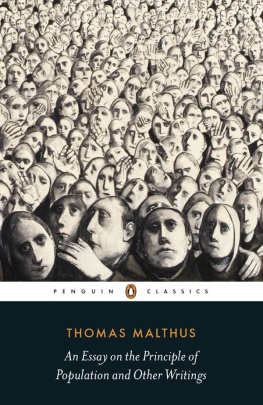Malthus Thomas-Robert - The Grounds and Opinions on the Policy of Restricting Importation
Here you can read online Malthus Thomas-Robert - The Grounds and Opinions on the Policy of Restricting Importation full text of the book (entire story) in english for free. Download pdf and epub, get meaning, cover and reviews about this ebook. genre: Science. Description of the work, (preface) as well as reviews are available. Best literature library LitArk.com created for fans of good reading and offers a wide selection of genres:
Romance novel
Science fiction
Adventure
Detective
Science
History
Home and family
Prose
Art
Politics
Computer
Non-fiction
Religion
Business
Children
Humor
Choose a favorite category and find really read worthwhile books. Enjoy immersion in the world of imagination, feel the emotions of the characters or learn something new for yourself, make an fascinating discovery.
- Book:The Grounds and Opinions on the Policy of Restricting Importation
- Author:
- Genre:
- Rating:5 / 5
- Favourites:Add to favourites
- Your mark:
- 100
- 1
- 2
- 3
- 4
- 5
The Grounds and Opinions on the Policy of Restricting Importation: summary, description and annotation
We offer to read an annotation, description, summary or preface (depends on what the author of the book "The Grounds and Opinions on the Policy of Restricting Importation" wrote himself). If you haven't found the necessary information about the book — write in the comments, we will try to find it.
Malthus Thomas-Robert: author's other books
Who wrote The Grounds and Opinions on the Policy of Restricting Importation? Find out the surname, the name of the author of the book and a list of all author's works by series.
The Grounds and Opinions on the Policy of Restricting Importation — read online for free the complete book (whole text) full work
Below is the text of the book, divided by pages. System saving the place of the last page read, allows you to conveniently read the book "The Grounds and Opinions on the Policy of Restricting Importation" online for free, without having to search again every time where you left off. Put a bookmark, and you can go to the page where you finished reading at any time.
Font size:
Interval:
Bookmark:
The Project Gutenberg EBook of The Grounds of an Opinion on the Policy of
Restricting the Importation of Foreign Corn: intended as an appendix to "Observations on the corn laws", by Thomas Malthus
This eBook is for the use of anyone anywhere at no cost and with
almost no restrictions whatsoever. You may copy it, give it away or
re-use it under the terms of the Project Gutenberg License included
with this eBook or online at www.gutenberg.net
Title: The Grounds of an Opinion on the Policy of Restricting the Importation of Foreign Corn: intended as an appendix to "Observations on the corn laws"
Author: Thomas Malthus
Posting Date: July 25, 2009 [EBook #4335]
Release Date: August, 2003
First Posted: January 11, 2002
Language: English
*** START OF THIS PROJECT GUTENBERG EBOOK IMPORTATION OF FOREIGN CORN ***
Produced by Charles Aldarondo. HTML version by Al Haines.
Importation of Foreign Corn; intended as an Appendix to
"Observations on the Corn Law"
in the East India College, Hertfordshire.
and J. Johnson and Co., St. Paul's Church Yard, 1815.
The professed object of the Observations on the Corn Laws, which I published in the spring of 1814, was to state with the strictest impartiality the advantages and disadvantages which, in the actual circumstances of our present situation, were likely to attend the measures under consideration, respecting the trade in corn.
A fair review of both sides of the question, without any attempt to conceal the peculiar evils, whether temporary or permanent, which might belong to each, appeared to me of use, not only to assist in forming an enlightened decision on the subject, but particularly to prepare the public for the specific consequences which were to be expected from that decision, on whatever side it might be made. Such a preparation, from some quarter or other, seemed to be necessary, to prevent those just discontents which would naturally have arisen, if the measure adopted had been attended with results very different from those which had been promised by its advocates, or contemplated by the legislature.
With this object in view, it was neither necessary, nor desirable, that I should myself express a decided opinion on the subject. It would hardly, indeed, have been consistent with that character of impartiality, which I wished to give to my statements, and in which I have reason to believe I in some degree succeeded.(1*)
These previous statements, however, having been given, and having, I hope, shewn that the decision, whenever it is made, must be a compromise of contending advantages and disadvantages, I have no objection now to state (without the least reserve), and I can truly say, wit the most complete freedom from all interested motives, the grounds of a deliberate, yet decided, opinion in favour of some restrictions on the importation of foreign corn.
This opinion has been formed, as I wished the readers of the Observations to form their opinions, by looking fairly at the difficulties on both sides of the question; and without vainly expecting to attain unmixed results, determining on which side there is the greatest balance of good with the least alloy of evil. The grounds on which the opinion so formed rests, are partly those which were stated in the Observations, and partly, and indeed mainly, some facts which have occurred during the last year, and which have given, as I think, a decisive weight to the side of restrictions.
These additional facts are
1st, The evidence, which has been laid before Parliament, relating to the effects of the present prices of corn, together with the experience of the present year.
2dly, The improved state of our exchanges, and the fall in the price of bullion. And
3dly, and mainly, the actual laws respecting the exportation of corn lately passed in France.
In the Observations on the corn laws, I endeavoured to shew that, according to the general principles of supply and demand, a considerable fall in the price of corn could not take place, without throwing much poor lad out of cultivation, and effectually preventing, for a considerable time, all further improvements in agriculture, which have for their object an increase of produce.
The general principles, on which I calculated upon these consequences, have been fully confirmed by the evidence brought before the two houses of Parliament; and the effects of a considerable fall in the price of corn, and of the expected continuance of low prices, have shewn themselves in a very severe shock to the cultivation of the country and a great loss of agricultural capital.
Whatever may be said of the peculiar interests and natural partialities of those who were called upon to give evidence upon this occasion, it is impossible not to be convinced, by the whole body of it taken together, that, during the last twenty years, and particularly during the last seven, there has been a great increase of capital laid out upon the land, and a great consequent extension of cultivation and improvement; that the system of spirited improvement and high farming, as it is technically called, has been principally encouraged by the progressive rise of prices owing in a considerable degree, to the difficulties thrown in the way of importation of foreign corn by the war; that the rapid accumulation of capital on the land, which it had occasioned, had so increased our home growth of corn, that, notwithstanding a great increase of population, we had become much less dependent upon foreign supplies for our support; and that the land was still deficient in capital, and would admit of the employment of such an addition to its present amount, as would be competent to the full supply of a greatly increased population: but that the fall of prices, which had lately taken place, and the alarm of a still further fall, from continued importation, had not only checked all progress of improvement, but had already occasioned a considerable loss of agricultural advances; and that a continuation of low prices would, in spite of a diminution of rents, unquestionably destroy a great mass of farming capital all over the country, and essentially diminish its cultivation and produce.
It has been sometimes said, that the losses at present sustained by farmers are merely the natural and necessary consequences of overtrading, and that they must bear them as all other merchants do, who have entered into unsuccessful speculations. But surely the question is not, or at least ought not to be, about the losses and profits of farmers, and the present condition of landholders compared with the past. It may be necessary, perhaps, to make inquiries of this kind, with a view to ulterior objects; but the real question respects the great loss of national wealth, attributed to a change in the spirit of our legislative enactments relating to the admission of foreign corn.
We have certainly no right to accuse our farmers of rash speculation for employing so large a capital in agriculture. The peace, it must be allowed, was most unexpected; and if the war had continued, the actual quantity of capital applied to the land, might have been as necessary to save the country from extreme want in future, as it obviously was in 1812, when, with the price of corn at above six guineas a quarter, we could only import a little more than 100,000 quarters. If, from the very great extension of cultivation, during the four or five preceding years, we had not obtained a very great increase of average produce, the distresses of that year would have assumed a most serious aspect.
Font size:
Interval:
Bookmark:
Similar books «The Grounds and Opinions on the Policy of Restricting Importation»
Look at similar books to The Grounds and Opinions on the Policy of Restricting Importation. We have selected literature similar in name and meaning in the hope of providing readers with more options to find new, interesting, not yet read works.
Discussion, reviews of the book The Grounds and Opinions on the Policy of Restricting Importation and just readers' own opinions. Leave your comments, write what you think about the work, its meaning or the main characters. Specify what exactly you liked and what you didn't like, and why you think so.







